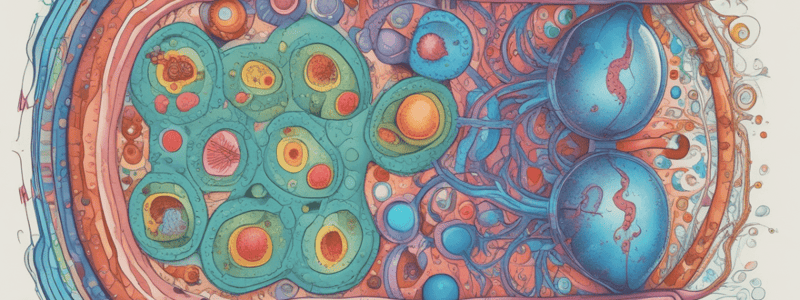Podcast
Questions and Answers
What is the main function of the cell membrane?
What is the main function of the cell membrane?
- To generate energy for the cell
- To synthesize proteins
- To regulate what enters and leaves the cell (correct)
- To store genetic information
What is the process by which cells reproduce?
What is the process by which cells reproduce?
- Genetics
- Photosynthesis
- Metabolism
- Cell Division (correct)
What is the mechanism of evolution that favors favorable traits in a population?
What is the mechanism of evolution that favors favorable traits in a population?
- Gene Flow
- Natural Selection (correct)
- Genetic Drift
- Speciation
Flashcards are hidden until you start studying
Study Notes
Cells
- Basic unit of life
- Structural and functional units of living organisms
- Consist of:
- Cell membrane (plasma membrane)
- Cytoplasm
- Genetic material (DNA or RNA)
Cell Structure
- Cell Membrane (Plasma Membrane)
- Semi-permeable membrane
- Regulates what enters and leaves the cell
- Cytoplasm
- Jelly-like substance inside the cell membrane
- Site of metabolic activities
- Genetic Material
- DNA (deoxyribonucleic acid) or RNA (ribonucleic acid)
- Carries genetic information
Cellular Processes
- Metabolism
- Conversion of energy and nutrients
- Involves anabolic (building) and catabolic (breaking down) reactions
- Photosynthesis
- Process by which plants convert light energy into chemical energy
- Occurs in chloroplasts
- Cell Division
- Process by which cells reproduce
- Types: Mitosis (somatic cells) and Meiosis (gametes)
Genetics
- Inheritance
- Passing of traits from parents to offspring
- Determined by genetic information (DNA)
- Genotype
- Genetic makeup of an organism
- Phenotype
- Physical and behavioral characteristics of an organism
Evolution
- Theory of Evolution
- Process by which species change over time
- Driven by natural selection, genetic drift, and gene flow
- Natural Selection
- Mechanism of evolution
- Favorable traits are selected for, increasing their frequency in a population
- Speciation
- Process by which new species emerge
- Results from geographic isolation, genetic drift, or other factors
Cells
- Cells are the basic unit of life and are structural and functional units of living organisms
- Cells consist of:
- Cell membrane (plasma membrane)
- Cytoplasm
- Genetic material (DNA or RNA)
Cell Structure
Cell Membrane (Plasma Membrane)
- Semi-permeable membrane that regulates what enters and leaves the cell
Cytoplasm
- Jelly-like substance inside the cell membrane
- Site of metabolic activities
Genetic Material
- DNA (deoxyribonucleic acid) or RNA (ribonucleic acid) carries genetic information
Cellular Processes
Metabolism
- Conversion of energy and nutrients
- Involves anabolic (building) and catabolic (breaking down) reactions
Photosynthesis
- Process by which plants convert light energy into chemical energy
- Occurs in chloroplasts
Cell Division
- Process by which cells reproduce
- Types: Mitosis (somatic cells) and Meiosis (gametes)
Genetics
Inheritance
- Passing of traits from parents to offspring
- Determined by genetic information (DNA)
Genotype and Phenotype
- Genotype: genetic makeup of an organism
- Phenotype: physical and behavioral characteristics of an organism
Evolution
Theory of Evolution
- Process by which species change over time
- Driven by natural selection, genetic drift, and gene flow
Natural Selection
- Mechanism of evolution
- Favorable traits are selected for, increasing their frequency in a population
Speciation
- Process by which new species emerge
- Results from geographic isolation, genetic drift, or other factors
Studying That Suits You
Use AI to generate personalized quizzes and flashcards to suit your learning preferences.



